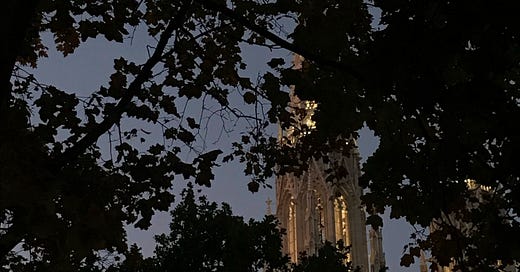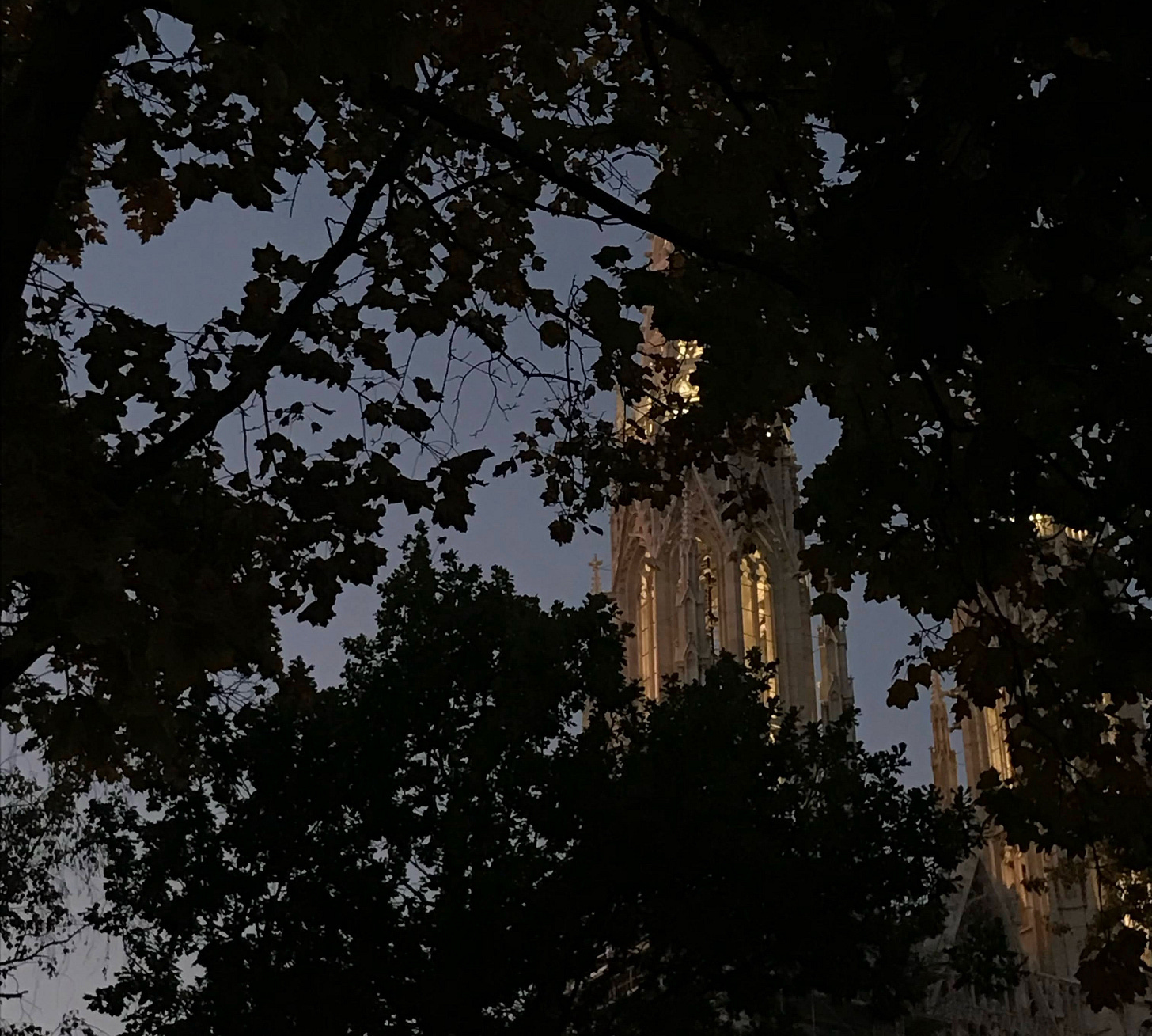“Places without Names” is the third section of “A Map of Vienna,” originally published by The Decadent Review in 2021.
This revised version is dedicated to Dimitri Kaufman.
Alienation
The oscillating disposition of the poet, the technique of the diarist, the eyes of the frog.
White Coffee Cup
One is always recalling things that never happened or existed in just that way: expressions (verbal or facial), insults, places and place-names, confessions, rooms and the objects in them. Where you remembered a black comb and a tidy box of matches, there were only dying flies, pulped tissues and little specks of bloody dandruff. It has nothing to do with lies or honesty. It is the truth grown into itself, the other side without which reality, no matter how well it is recalled, would signify as much as a cough from a perfectly healthy throat.
Station
If it has not happened already, there will come a day when the trains will run, but nobody will board them. White lights will hover over turnstiles and not one human reflection will disturb the liquid surfaces of the painted tile walls and columns. A train hurtles to a stop. The doors open and wait for a moment. They close, and the train begins again, hurtling through black tunnels. The platform is quiet, the stairs are empty, the connecting corridors are immaculate vectors of extension without content, pure for all their accumulated grime. Now and then, there is a sucking of displaced air and a muffled rumble. A sandwich wrapper and coffee cup lid slide across the ground toward the opening of a staircase and rustle downward, stopping at the foot of a gleaming, blue column. It feels as though the city above had been submerged in a deep flood that had inexplicably missed the descending entrance to the metro.
Memory
A line remembered from a book one read a very long time ago stands out from hundreds of dim pages and millions of black serifs, as if illuminated softly in gold or hemmed by ancient dye: the harm memory must do to a book in order to remember a single line, which, when one finally opens the book to look for it, has disappeared like a flower in a rainstorm.
Underpass
The words in the dictionary at your fingertips have all taken up masks, but their deep eyes still peer through holes cut flush with the lines of their faces. Speaking with an acquaintance on a street corner, you hear the smooth layers of mask and eye interchange and wink, each syllabic jab forming the playful, dual aspect of a 2-dimensional drawing made to represent a 3-dimensional form, but which insists on being both. Like a packing box gutted of the incidental, shapeless contents that gave it its basic structure and the momentary courage for depth, everything collapses—even words that were already flat.
Empty Bottle
A poet wants to get inside of a room that has no windows, no doors, not even a vent for air, and put a few words together, raise a sentence or two up from the ground (to the height of a little gnome) until finally a window appears in the wall that looks out onto a world completely different from the one that must have been there before.
Eine schöne Seele
An unspoken ambition remains a secret vanity.
Churchyard
The church graveyard has always been a miraculous, heavenly place—but only for the person who, when confronted with the question of faith, does not know what to say. A dark flicker in her eye. A confession of what she would only like to say; she is silent from a sense of honesty, but in the midst of the graveyard, maybe even while a solemn church bell subdues the irregularities of sun and wind, or while the first drops of rain fall, she feels that she stands in the midst of an afterlife that can only ever be real to the living.
For Ruskin
Clouds have appeared. It was sunny and cool before, but now there is a chilly autumn wind. I feel a jolt of excitement when I think that soon this weather will be the rule and not the exception. (It’s strange that from the quasi-fixed perspective of people, weather is one exception falling upon another, and it is this succession of rules degrading into something slightly outside of themselves, into apparent exceptions, that makes up the whole cycle of rules itself. ) When the rain comes, red ceiling tiles and the lead-gray stones across from my window shine the color of the clouds above them. This matted reflection, instead of throwing the sky back up to itself, brings the sky down into the structures and surfaces that reflect.
Wonder
One is overcome by a sense of paralyzing wonder—but for what? And for whom? For these situations and people that we have no use for, those things in life exposed to the possibility of love.
Staircase
There is an alley between two large streets, from which you can see the neighborhood directly to the north standing as if it were a lone village resting at the edge of a sea. But it borders a canal, not a sea, and if it is alone, it is only so virtually, for there are no hard and fast lines separating the neighborhood from the others, each very different, that surround it. The alley only looks like an alley when you are approaching its narrow opening, or when you are stepping onto the next main road—when you are already outside of it. Within its confines however, the sky opens up and the rooftops sing with the cold light of autumn, while what you thought was merely an alley turns into an alpine peak. People below, down on W____strasse, look small and humble. A man puts groceries into the back of his car. He might be a peasant in a Bruegel painting carrying a sack of potatoes, so great is the distance between the two of you. And there you see some children pushing around on scooters. One of them is a little blond boy. He has a serious expression and kicks around in spite of himself. The others laugh and for a moment the distance that was so great, between the height of the alley (did I mention the steep staircase which runs through it?) and the pool of people and life down below, closes. You remember being a serious child floating like a paper ship in the wake of other children. You remember feeling your own seriousness, like a lead blanket draped over your shoulders, that you did not have the strength to throw off because you were too small and did not understand, but you badly wanted to laugh and be silly as if there were no weight in the world but the lightness of the small shoes on your feet, but the children disappear down the street and again the alley, the winding, tight staircase is quiet. A woman has been watching you from her window this whole time, discreet as a tree or a bench, and when you look her way she blushes and ducks inside her little window. Well, clouds have appeared—clouds appear when one looks away for too long, and sometimes only a very short moment is too long—and the rooftops are dark, they no longer sing, they are quiet, only the horizon still glows with a far away light. It is time to go down the steps, one by one, dodging the leaves so as not to disturb the alarming quiet, to rejoin the neighborhood and walk north where it feels like you might find yourself at the mouth of a sea, in a harbor or a bay studded with ships and commerce and the sound of waves but where you will only find a quiet canal and, instead of a village, a neighborhood encircled by vague outlines. And when you have gone down into the streets and feel the sky narrow and the sounds of the city rudely rushing up to you from every direction, you look over your shoulder thinking that you might see the top of the staircase in the alley, but of course there is nothing there, the alley has already somehow sunken away into the other side of a great distance.





